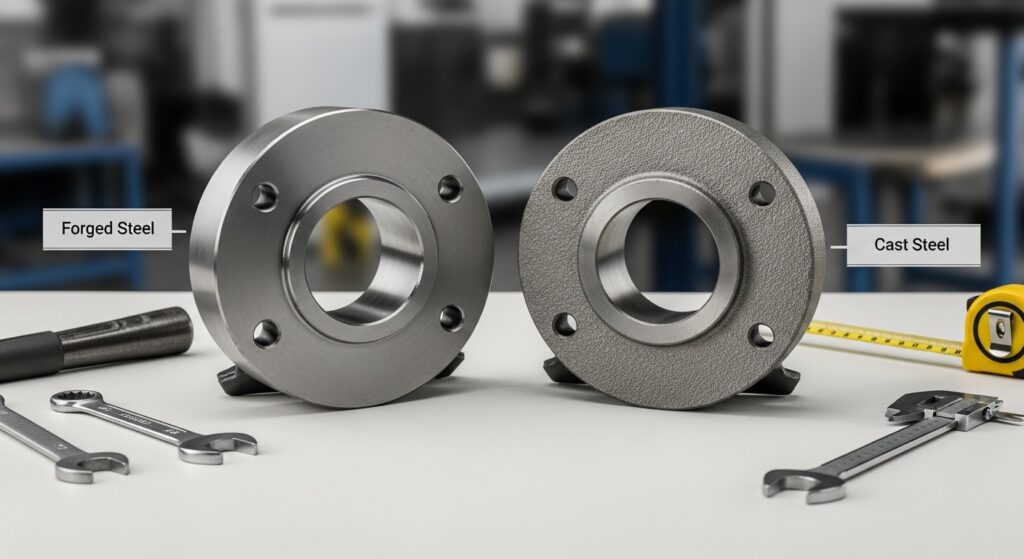You’re designing a piping system, and you need to choose the right steel pipe flange. But with so many options, how do you decide? The biggest choice often comes down to how the flange is made: forging or casting.
This isn’t just a manufacturing detail. It directly impacts the strength, safety, and cost of your project. We’ll cut through the confusion and give you a clear, side-by-side comparison so you can choose with confidence.

The Core Difference: How They’re Made
Think of it like baking. Forging is like kneading dough it works the material to make it stronger. Casting is like pouring batter into a mold—it takes the shape easily but is less dense.
- Forged Steel Flanges start as a solid piece of steel, called a billet. This billet is heated until it’s red-hot and then shaped under immense pressure from a hammer or press. This process compacts the steel and aligns its grain structure.
- Cast Steel Flanges are created by pouring molten steel into a pre-shaped mold. The metal cools and solidifies into the flange shape. It’s then removed and machined to its final dimensions.
Forged vs. Cast: A Quick Comparison Table
| Feature | Forged Steel Flange | Cast Steel Flange |
|---|---|---|
| Strength & Durability | Higher. Better for impact and vibration. | Lower. Can be more brittle. |
| Internal Integrity | Denser, with no hidden holes or cracks. | Can have tiny internal voids from the cooling process. |
| Best For | High-pressure, high-temperature, critical jobs. | Low/medium pressure, larger sizes, complex shapes. |
| Cost | More cost-effective for standard, high-volume sizes. | Often cheaper for large or one-off custom flanges. |
When to Choose a Forged Steel Flange
Choose a forged carbon steel flange when failure is not an option. Their superior strength makes them the go-to for tough jobs.
Ideal for:
- High-pressure and high-temperature systems.
- Applications with lots of vibration or shock (like near pumps or compressors).
- Critical services in oil and gas, power plants, and chemical processing.
Forged flanges are the industry standard for most ANSI and ASME B16.5 steel pipe flanges because of their proven reliability. A quick tip: if you’re working on a standard, high-pressure line, you’re almost certainly looking for a forged flange.
When a Cast Steel Flange is the Better Pick
Casting is fantastic for flexibility. If you need a massive or unusually shaped steel flange plate, casting is often the only way to make it.
Ideal for:
- Large diameter pipes (often 24 inches and above).
- Flanges with complex, non-standard geometries.
- Low to medium pressure applications, like water distribution or certain plumbing systems.
One thing to consider: while the initial cost might be lower, always ensure your cast flanges come from a reputable foundry that tests for internal defects. For a deep dive into specific types, you can explore the extensive inventory of carbon steel flanges at Texas Flange.
Your Flange Questions, Answered (FAQ)
1. Can you visually tell the difference between forged and cast flanges?
Usually not after final machining and finishing. Both look identical because the casting or forging marks are removed. The difference is in the internal grain structure and density, which is why material certifications from your supplier are so important.
2. Which is stronger: forged or cast steel?
Forged steel is stronger. The forging process compresses the metal’s grain structure, giving it higher tensile and impact strength. This makes it tougher and more reliable under high stress.
3. Are forged flanges always more expensive?
Not always. For standard sizes and high-volume orders, forged flanges are very competitive. Cast flanges can be more expensive for custom, one-off designs. It’s best to get quotes for your specific needs.
4. Can I mix a forged flange with a cast valve?
Yes, you can, as long as both have the same pressure rating (like Class 150, 300), material grade, and facing. The bolting will create a seal between them. Just ensure the entire assembly is designed for your system’s pressure and temperature.
5. Why is a forged flange better for high pressure?
The forging process creates a denser, more uniform metal structure with no internal voids. This homogeneity allows it to handle intense internal pressure without weak points that could lead to a failure.
6. Where can I buy reliable forged steel flanges?
It’s crucial to source from trusted distributors who provide full material traceability and certifications. For a wide range of proven products, you can check out the selection of forged steel flanges at Texas Flange.
Still Unsure Which Flange You Need?
Choosing the right component is key to your system’s safety and longevity. The team at flangessteel.com is built on years of industry experience. We don’t just sell flanges; we provide the expertise to help you select the perfect carbon steel flange or steel flange plate for your specific pressure, temperature, and application requirements.
Get a custom quote or contact expert for technical support today. Let our experts help you build a safer, stronger pipeline